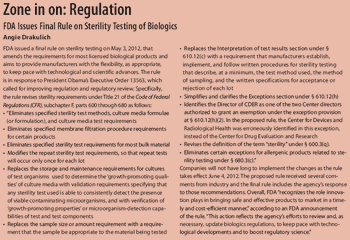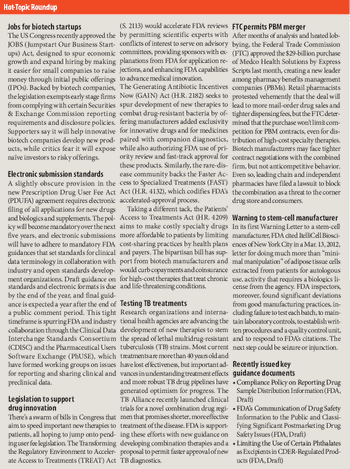
The authors, part of the International Consortium on Innovation and Quality in Pharmaceutical Development (IQ Consortium), explore and define common industry approaches and practices when applying GMPs in early development.

The authors, part of the International Consortium on Innovation and Quality in Pharmaceutical Development (IQ Consortium), explore and define common industry approaches and practices when applying GMPs in early development.

On July 9, 2012, Congress passed the Generic Drug User Fee Act in an effort to expedite the process of bringing generic drugs to market. The Act authorizes the collection of user fees from generic-drug manufacturing companies for the first time in the industry's history.

ISPE has issued a guidance that is intended to help companies meet cGMP requirements for packaging, labeling, and warehousing facilities and avoid problems such as product adulteration, product mix-up, label mix-up, and misbranding.

FDA has issued a draft guidance on the labeling of OTC products that contain acetaminophen. The draft guidance would give manufacturers an alternative option to properly clarify the risk of liver damage in OTC acetaminophen-containing products.

EMA and MHRA provide insight into increased GMP deficiencies.

IQ Consortium representatives explore industry approaches for applying GMPs in early development.

Careful attention to detail will help to prevent valuable assets from "melting" away.

A Q&A with FDA Deputy Commissioner Deborah Autor.

The European Medicines Agency's Committee for Orphan Medicinal Products made recommendations for nine orphan drug designations during its June 2012 meeting. Included in COMP's recommendations were four designation applications for rare forms of lipodystrophy.

In July 2012, new pharmacovigilance legislation will come into effect across the EU as a result of changes adopted in 2010, specifically EU Regulation No. 1235 and Directive 84.

Q&A with Peter Smith, Strategic Compliance Consulting, PAREXEL International, and a former senior official with FDA, on change management best practices.

IQ Consortium representatives explore and define common industry approaches and practices for applying GMPs in early development.

New price-control policy has domestic and global firms waiting on the sidelines to launch products.

New legislation, government programs aim to bolster drug discovery and reduce regulatory hurdles.

Even the slightest of errors in exponential calculations can cause the biggest of headaches.

ICH Q11, the anticipated guideline from the International Conference on Harmonization, titled Development and Manufacture of Drug Substances, has achieved international consensus. Q11 has been one of the fastest guidelines to move through the ICH harmonization process.

Manufacturers seek clear path to develop safe-use approaches for more risky OTC therapies.

It's better to catch costly mistakes in the laboratory before they reach the accounting department.

The author outlines the scientific aspects of forced degradation studies that should be considered in relation to ANDA submissions.

How niche strategies can offer mainstream potential for biopharmaceutical companies.

Poland's government aims to make the Eastern European country a biotech powerhouse.

FDA has issued Warning Letters to 10 companies that manufacture and distribute dietary supplements that contain dimethylamylamine. FDA cited the companies for marketing the supplements without submitting evidence that the products are safe.

FDA has released a final guidance describing cGMP for preparing media fills for validation of aseptic preparations for positron emission tomography drugs.

The management board of the European Medicines Agency has introduced a range of new measures to strengthen and extend its conflicts of interest policy for scientific-committee members and experts, as well as for members of the management board.

The decision by the Indian patent authorities to issue a compulsory license for a generic version of a Bayer anticancer drug engenders debate.